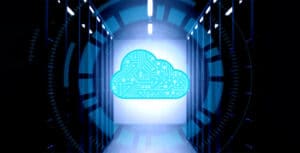Enterprise NAS vs. Consumer NAS
The benefit of a NAS device is that it can use a technology called RAID. This tech allows the software that manages the NAS devices to distribute and duplicate the data it stores across multiple hard disks. That means even if one of the drives fails, the RAID system can take in a new, empty drive and repopulate it with the data the failed drive was carrying. The file-based data transferring method helps a lot for those storage-entry and prosumer users. There are more APPs available to be installed in a consumer NAS but, do you really think that those APPs are MUST for your enterprise storage requirement nowadays?
Everything you need can almost be done via mobile device in the 2020s as the technology has evolved; you need to care about the nature of what a storage device should deliver. Do you want to open more backdoors to be accessed by someone in the public network and steal your privacy? More APPs come with more vulnerabilities, probably this isn’t a concern a few years ago, but the world is changing.
Why Enterprise Storage Matters
One of the main reasons to get an enterprise storage device is the extra backup potential. Many of them come with multiple bays for multiple disks so that you can set up two disks stocked with the same data—technically known as a RAID 1 configuration. With this setup, if one drive fails, your files are still available on the second one. Alternatively, you could manage more disks as one large drive (RAID 5). Don’t worry if all this is starting to sound too complicated—the onboard software handles everything.
Another advantage of an enterprise storage device is that it’s accessible anywhere on your local network, meaning you can download and upload files with your phone, tablet, and laptop. It’s always on and always available, and it’s one of the biggest advantages for your enterprise storage. Most storage devices let you access your files over the internet, too (if the network environment is set up properly), so you can get at your data from the office or while you are traveling.
It is all about the protection and availability of your essential data in any circumstances from anywhere. People may say the cost of an enterprise storage device is expensive, but it is no longer this situation nowadays.
What keys do you really care about when using enterprise storage?
More Storage Space
A NAS device will add sufficient storage space to a local computer, thereby boosting the available storage space for total efficiency. It is worth noting that most laptops and computers have limited storage space, which could be a better choice for enterprise storage.
It is cost-effective to adopt a NAS storage device, especially because one does not have to purchase a certain amount of space for individual users. Using a NAS device, space is pooled together in a manner that one only uses just the amount of space they need, thereby freeing space for data-hungry users.
Private Cloud Storage
The convenience of cloud storage can never be underestimated. However, for any enterprise storage users who store sensitive information in a cloud-based system, there is fear about who can access their information. Luckily for anyone with such fear, a NAS device will allow efficient cloud-based storage without the possibility of snooping.
Data Protection
There are those accidents that will damage our computers, thereby compromising the data stored therein. A laptop could drop and get damaged, or a drink could accidentally spill on a laptop and ruin every piece of data stored in it. Fortunately, when one uses a NAS device as enterprise storage that is not affected by local hardware failures, their data is safe.
Performance and Scalability Considerations
Definitely, this is one of the most important features if you would like to have this NAS be a multi-functional system that supports lots of fancy functions, like a singing system – a Karaoke Television – can easily update the database to include thousands of songs to be an entertainment device, where is hacker’s favorite to visit frequently.
Feeling bored during the quarantine period due to COVID-19? No problem, fancy NAS brings you the ability to install PC games on it, kill time a lot with fun, and surely bring more kinds of stuff to recover your important data from Ransomware; time will consume exponentially when you are dealing with the recovery.
The more you install, the more dangerous things you will face; plus, the system OS will become unstable from time to time even if you don’t connect to the public network to update something.
Security and Data Protection Features
Gaining more features at the same cost could be the nature of humanity. It is expectable to see people trying to get more APPs installed in a price-affordable NAS enterprise storage just showing that, “Well, I spent only USD 300 to get so many functionalities in my new NAS.”. Sometimes, you don’t really need to use them; you want to prove, “My decision is right.”
What did those bring you? Every single APP could contain the vulnerability, a small patch should fix every vulnerability, every patch needs to be updated after a firmware (NAS OS) upgrade, and a reboot of the system should finish every firmware upgrade… hey, you are not an IT guy, you purchased this NAS for using instead of testing.
And one more thing, honestly speaking, it could be nothing to upgrade/reboot the NAS frequently, but I am sure that you don’t want your privacy to be revealed in the public network; reputation is priceless.
Cost Efficiency and ROI Factors
Many viruses are running outside the public network. The most famous one is Ransomware – encrypting your data and decrypting it after you pay for it. This might be easy to resolve. How about data stolen? Company-A is designing a new product, and Company-B has stolen the commercial plan or roadmap; a similar product has been announced before the announcement date of Company-A. How much do you think it will cost?
The point is, what can we do to prevent it? Instead of recovering the data or catching up with the competitor.
WORM, Updated daemons, and Packages
WORM (not a bug, it means ‘Write Once Read Many’) is a new technique designed and implemented in the storage market in recent years. Literally speaking, the written data won’t be able to change (delete or modify) during the defined period, making a perfect method to prevent the modification/deletion that came from those viruses.
Another prevention you may apply is to keep updating the latest version of packages installed on the NAS system, and as mentioned, the more you have installed, the more you will need to keep updated. Keeping as simple as possible for your system will eliminate the loads for maintaining this part.
Future-Proofing Your Enterprise Storage
Any Tier-1 storage won’t chase the fancy features to be implemented in their OS but trying hard for decades to stabilize and simplify the very basic goal – Reliable – this is the fundamental of what enterprise storage should deliver. Designing an easy UI to operate and maintain, making everything as simple as possible, and reducing the efforts that an IT guy should deal with, managers can then spend valuable time and money on other important kinds of stuff. Every single enterprise storage shall target the goal like this.



